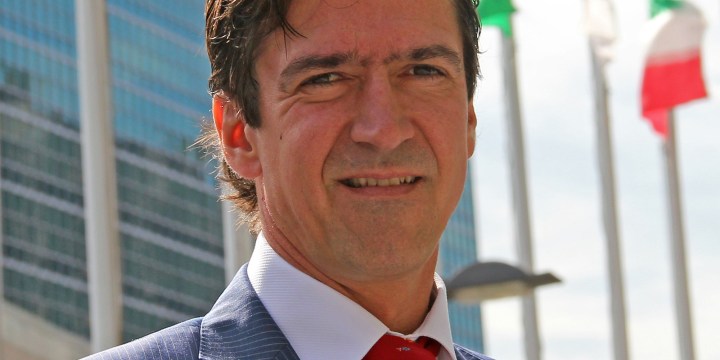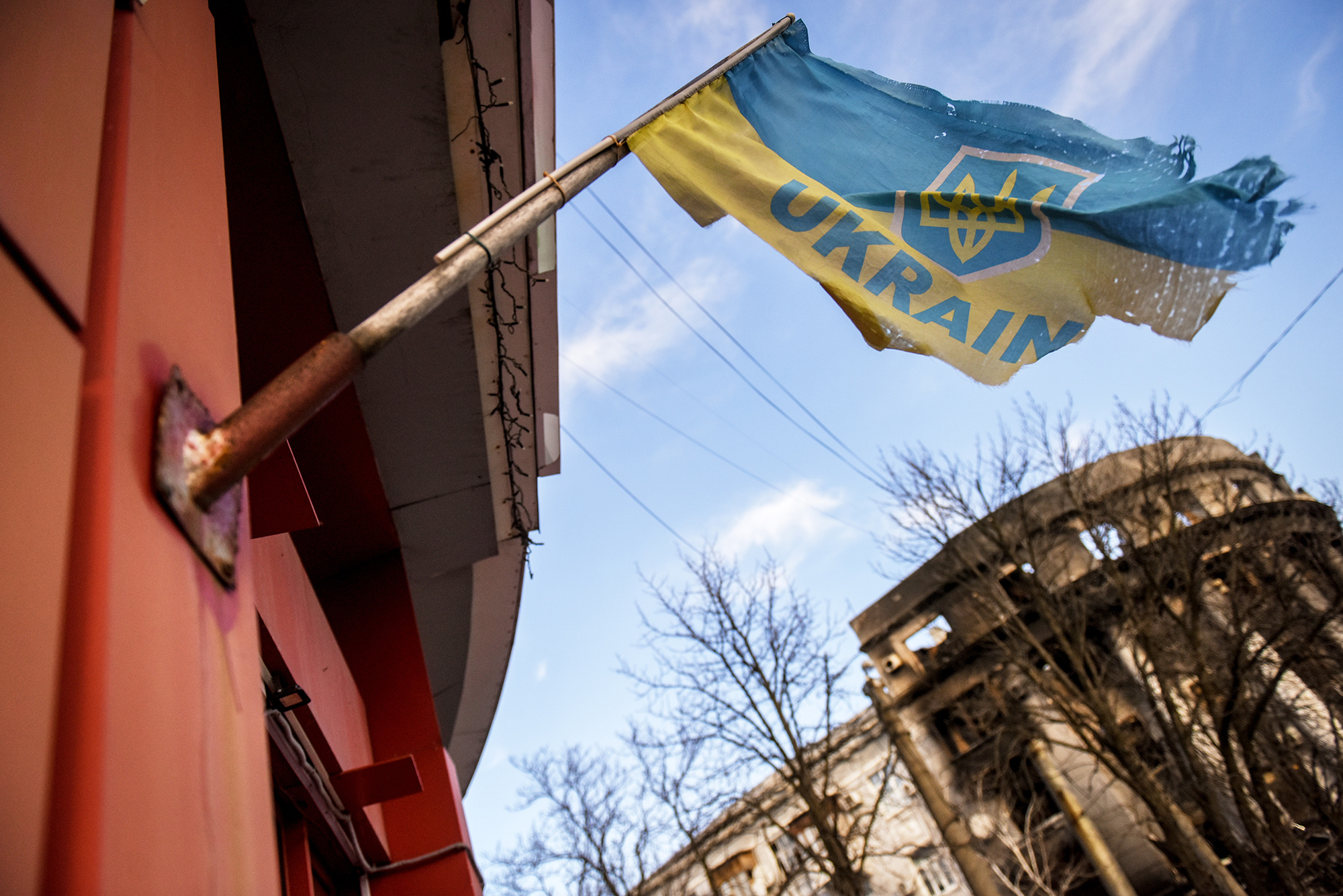INTERVIEW
Finland’s evolution is again being shaped by its menacing neighbour, Russia

Finland finds South Africa’s stance on Russia’s aggression against Ukraine particularly puzzling. In an interview, the country’s Under-Secretary of State, Kai Sauer, unpacked this and other issues.
The great events in independent Finland’s history have been shaped by its large and often menacing neighbour, Russia.
“The first big change was independence itself,” Finland’s Under-Secretary of State, Kai Sauer, told Daily Maverick during his visit to South Africa this week.
“And it also took place in a situation when Russia was in chaos.”
On 6 December 1917, Finland declared its independence from the Russian Empire (which it had been part of for 108 years), weeks after the Bolshevik revolution.
“Then the second big change was in 1991 when the Soviet Union collapsed,” Sauer said.
“And we started our path towards European integration. And now, in 2022, the last step is towards Nato,” he added, referring to Finland’s application, with Sweden, to join the North Atlantic Treaty Organisation (Nato) in a bid for protection against Russia, triggered by that country’s invasion of Ukraine.
Joining Nato a big political step
Despite objections from Turkey (Türkiye) and Hungary – which is sympathetic to Russia – Sauer expected Finland and Sweden to be admitted by Nato’s next summit in Vilnius, Lithuania, mid-year.
“And for us it is a major development. It is a big change in our foreign and security policy. One of the most fundamental changes in more than one hundred years of independence.”
Technically, joining Nato is “not such a big step”, Sauer said, as Finland had been participating in Nato programmes and operations since 1994.

A tattered Ukrainian flag posted near a burnt building on central square in Bakhmut, Donetsk region, eastern Ukraine, 19 January 2023. (Photo: EPA-EFE / Oleg Petrasyuk)
But “politically it is a big step”, he said, citing the huge concern in Finland provoked by the behaviour of its neighbour, Russia, with which it shares a border of more than 1,300km.
The government responded to an overnight jump in public support for joining Nato, from 20-25% to 70-80%. In Parliament, 188 out of 200 MPs supported the application to join Nato.
SA position on Russia worrying
Given Finland’s history – the Soviet Union invaded Finland in 1939 and seized nine percent of its territory, which it still holds – it is not surprising that Helsinki is perplexed about South Africa’s “non-aligned” stance – or, as some believe, its sympathy with Russia – and Pretoria’s refusal to condemn Russia’s invasion of Ukraine.
In his meeting with the Department of International Relations and Cooperation this week, Sauer had communicated Finland’s view that Russia’s war against Ukraine was a blatant violation of international law and of the Charter of the United Nations, Finnish officials said.
Sauer had encouraged South Africa – as a G20 member, Brics chair and an important regional leader – to send its leaders on a visit to Ukraine, as other G20 members, such as Saudi Arabia’s Prince Faisal, recently did.
Sauer told Daily Maverick that Finland was especially concerned about South Africa’s position on the war because it regards it as an important partner in Africa. That was also why it was dismayed when Pretoria closed its embassy in Helsinki in 2021.
As a result of this closure, the distance between the two countries was growing – even though South Africa was represented indirectly through its embassy in nearby Stockholm.
Closing embassies also went against the trend of expanding networks, especially in the light of the new international situation when it was important to have a global network to discuss matters of common interest, such as the situation in Ukraine.
Finnish officials said that in the meeting with Sauer, South African officials did not indicate if they intended to reopen the Helsinki embassy. But they said the officials regretted that Pretoria had had to close its embassy for financial reasons, and was waiting for the budgetary situation to improve. South Africa was considering assigning a desk officer to its Stockholm embassy who would be dedicated to covering Finland.
Much to offer in education
Education is an important field of cooperation between Finland and South Africa, in large part because Finland has an internationally renowned education system.
Last October, the education ministers of the two countries agreed that Finland would share its expertise in early childhood education and education training. Sauer said this cooperation was under way.
Read more in Daily Maverick: “SA education experts weigh in on emulating Finland’s teacher training strategies”
He noted that teacher training was the essence of the Finnish educational system. A recent study had shown that Finns rated teachers as among the top three ideal marriage partners, along with doctors and lawyers.
“The teachers in Finland enjoy high societal status and they are also well educated.” Teaching was not a “fallback option” as in some countries like the US, he said, but just the opposite.
They were “a very important part of the societal fabric. That’s why we are investing in training them. And that’s why the results are also quite good.”
Sauer said some of this ethos could be transferred to South Africa through the commercial and exportable applications which Finland’s teacher training institutions had created.
New fault lines appearing
Finnish businesses generally had “quite strong interest in South Africa”, and investment opportunities had been enhanced by some government instruments, also from the AU, to facilitate more projects in the fields of digitalisation of Africa, clean energy and education.
He noted in particular that the European Union had mobilised about €150-billion so far for its Global Gateway initiative, which was helping EU companies to start projects in Africa.
He added that Nokia – as one of the three global 5G technology providers – was very interested in the South African market and the African market more broadly.
He agreed that Nokia was competing with the Chinese 5G provider Huawei, which has made large inroads in Africa, but has triggered plenty of criticism from the US and from European countries which suspect that it transmits confidential information about its clients to the Chinese state. It is alleged that all Chinese companies are obliged by Chinese law to do so.
“The world is being divided slowly according to different fault lines again,” Sauer said. “In the past, it was the Cold War, more or less. Now the fault lines are a bit more complicated.” Technology seems to be one such fault line.
“And you have to make your choice very carefully… with Nokia as your provider, you can rely that your relevant information, whether it’s relevant to the state or to the individual, is safe.
This was not only about the 5G technology, but because “in some countries” – he did not mention China by name – companies were obliged to provide information to their host state.
“This was not true of Finland or Nokia.”
Investment opportunities
Other Finnish expertise useful to South Africa is mainly in specialist services to make products and industries more competitive and more environmentally friendly, including in mining, Sauer said.
Russia’s aggression against Ukraine, which had cut Europe off from Russian oil and gas, had accelerated the transition from fossil fuels to alternative fuel sources, he said.
“This again makes our industry and technology competitive in that field, and this is something which can be shared with our partners in Africa.”
Finland has developed an efficient way of producing pulp and paper in an environmentally friendly way, also using the residue to generate energy.
Finland’s ambassador to South Africa, Anne Lammila, pointed out that the Finnish company Huhtamaki (which has been making moulded fibre containers in South Africa since 1955, including now for fast food chains McDonald’s and KFC) is about to open another factory here.
Sauer went on from South Africa to Maputo to chair a meeting of Finland’s ambassadors in Africa and to discuss the country’s new 2021 Africa strategy, which places greater emphasis on equal partnerships with the continent and its individual countries, rather than on a donor-recipient relationship, he said.
Finland’s ties in Africa at risk
Continentally, Russia’s war against Ukraine – clearly uppermost in European minds – could also manifest in Finland itself, as Sauer wondered whether the war might affect Finland’s relationships with Africa.
“I think it’s too early to say, but I’m not excluding it. Our taxpayers might ask one day why we are giving money to countries and governments who see the world so differently from us,” he said, referring to, among other issues, that several African countries – including South Africa – have abstained from UN General Assembly votes condemning Russia’s aggression against Ukraine.
“But we have not entered that discussion yet.”
Wagner’s dangerous influence
Finland, like other Western countries, is also concerned about the growing influence in Africa of the ruthless and rapacious private Russian military company, Wagner, which is believed to have close ties to Russian President Vladimir Putin.
Last week, the military junta in Mali – which has contracted Wagner – voted for the first time against one of the UN General Assembly resolutions condemning Russia. Some Africa experts believe that other countries where Wagner is present – or might soon be, such as Sudan, Central African Republic, Burkina Faso and even Cameroon – could also vote with Russia.
“This is a concerning trend to us, but I guess it should be primarily concerning to the African neighbours, because as I see it, there’s a clear pattern,” Sauer said.
“There are weak state structures in these countries and there are also some economic resources which are interesting to Russia.
“So the pattern is that they provide military or security assistance to these weak institutions, and then at the end, they take them over… as it happened in the Central African Republic and as it is quite close to happening in other countries as well.
“So you could ask, who would you give your house’s key to? Would you give it to Russia, to America, to China? I think my last choice would be Russia and Wagner, in reply to this question. It’s really difficult to get out of that, once you are in that game.” DM

















 Become an Insider
Become an Insider
Comments - Please login in order to comment.